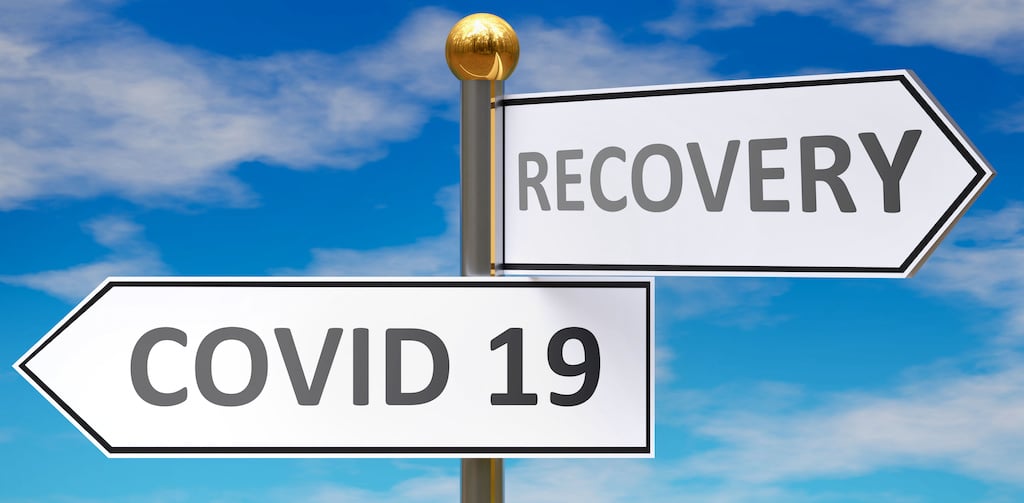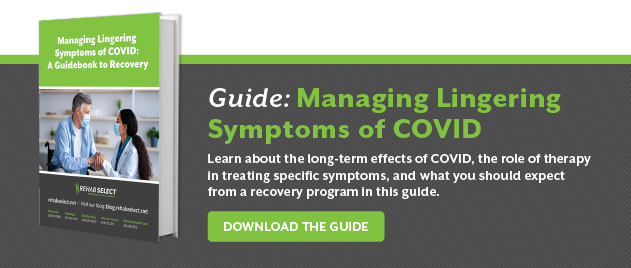
Over the past year, researchers have been avidly working to uncover any information they can about COVID-19: specifically, how to prevent, detect, and treat it. Every new discovery related to COVID-19 gives long-term care providers more effective tools to care for their patients every day.
One way medical professionals are addressing the more prolonged impact of the virus is through long-term COVID recovery and rehabilitation programs. These programs offer interventions tailored to the specific effects the virus causes to your body long after COVID leaves your system.
To understand how COVID recovery programs work, let’s take a look at the ways the virus impacts the body and how rehabilitation therapies can maximize recovery.
Typical COVID Progression of Symptoms
One of the difficulties this recent pandemic presents is that COVID is difficult to treat and affects everyone differently. One person might be asymptomatic, while another may suffer fatal effects.
Symptoms of coronavirus typically appear between 2 to14 days after exposure, and most people recover fully after 2 to 6 weeks. Symptoms have some similarities to cold and flu viruses, but coronavirus is a different strain of infection that’s highly contagious and can cause more serious symptoms.
Common symptoms during the beginning stages include:
- Fever
- Congestion and cough
- Loss of smell or taste
- Difficulty breathing
- Tiredness
- Weak or achy muscles
- Nausea
- Diarrhea
Sometimes, the virus is more severe or causes complications. For example, stress to the organs can lead to damage and fluid buildup in the lungs can lead to pneumonia.
Complications related to coronavirus include:
- Pneumonia
- Organ failure
- Blood clots
- Difficulty breathing
- Heart damage
- Respiratory distress
The immune response to COVID-19 can also lead to risk for other infections and viruses.
Potential Long-Term COVID Effects
Once the COVID virus is no longer active in your system, you may still feel the lingering effects. Nearly half of adults over 50 report symptoms that last over two weeks after contracting the virus. The term “COVID long-haulers” is the popular way to describe those who feel the effects months after their diagnosis.
The virus can cause lasting damage to the cardiovascular, respiratory, and other systems that require continuing care. Lingering symptoms related to COVID that need to be addressed might include:
- Dehydration
- Nutritional deficiencies
- Sleeping difficulties
- Mental fog
- Weakness or fatigue
- Changes in mood
- Inflammation
- Heart or lung problems
It’s important to remember that COVID recovery is not always linear. You may have setbacks, flare-ups, and persistent difficulties, but the best way to get through them is to have a team of knowledgeable experts by your side.
COVID recovery programs were designed to target these long-term COVID effects. If you or someone you care for still has difficulties related to COVID 4 weeks after diagnosis, you may benefit from a COVID recovery program.
Essential Components of a COVID Recovery Program
The purpose of a COVID recovery program is to help you recover as much pre-COVID function as possible and improve deficit areas. Your care team helps you restore as much independence and autonomy as possible.
Because the virus affects each person so differently, the process of recovery is unique for everyone. In fact, it’s precisely this need for individualized, adaptive recovery care that has led innovative rehabilitation care facilities to develop programs specifically designed for COVID-19 patients.
Depending on your needs, your treatment protocol might involve medical interventions, occupational therapy, physical therapy, speech therapy, counseling, and other services.
Medical Treatment
Medical treatment is an essential component of COVID recovery. Depending on your condition, you may have any combination of pulmonologists, cardiologists, physicians, nurses, therapists, and surgeons involved in your care.
If you develop a heart condition from COVID, for example, a cardiologist and other heart specialists will likely become involved in your care. If you have any preexisting conditions, your care team will continue treating you for those as well as take extra precautions related to COVID.
Medical monitoring is one vital part of care for everyone in recovery. You can expect nurses and staff to check your vitals often. They can detect changes in your temperature, heart rate, blood pressure, respiration, and oxygen levels early, which allows for quick response.
Medical treatment might also include ongoing care for COVID-related side effects, such as:
- IV antibiotics for pneumonia
- IV nutrition for deficiencies
- SMedication for blood clots
- Supplementary oxygen, and more
In addition to medical care, therapies such as occupational and physical therapy play a vital role in COVID recovery programs.
Occupational Therapy
In occupational therapy, you can work on getting back to routine tasks. Your therapist helps you navigate issues like weakness and fatigue so you can return to your basic daily activities.
Your therapist can teach you modifications to your regular routines that help you adapt to new challenges presented by lingering symptoms of the virus. If you get fatigued easily, for example, your therapist can work with you on energy conservation techniques. They may have you gradually increase the length of time you spend daily on tasks.
Physical Therapy
Physical therapy is beneficial for many COVID patients. This type of therapy addresses your physical abilities, such as your ability to move and your muscular strength.
Your physical therapist may use manual and mechanical techniques to build your aerobic and strength capacity. They address common COVID-related concerns like weakness and fatigue and help manage oxygen saturation.
Speech and Language Therapy
One common concern of coronavirus recovery is breathing difficulties. A speech and language pathologist can help you breathe more efficiently. They teach many techniques like pursed-lip breathing to address shortness of breath and anxiety.
A speech therapist can also address communication and swallowing challenges. Swallow training can, in turn, help you avoid the dehydration and nutrition deficiencies that often accompany swallowing challenges.
Counseling
The challenges of COVID not only affect your body but also your mental state. Isolation, mood changes, and cognitive impairment can have a serious impact on your life. Because of this, counseling is an integral part of COVID recovery programs. Therapists work closely with you, your nurses, and CNAs to help address your cognitive and emotional concerns.
A good COVID recovery program addresses your ongoing concerns from numerous angles so you can return to normal living as soon as possible.
New COVID Recovery Program at Rehab Select
Rehab Select has opened special coronavirus recovery units for post-COVID nursing home patients. Their specialty recovery program is designed specifically to help COVID-19 patients regain strength and get back to normal following infection.
The program consists of individualized care plans delivered by a team of experienced medical providers. A dedicated team of physicians, nurse practitioners, physical therapists, occupational therapists, pulmonologists, and psychologists provide comprehensive care.
Rehab Select is proud to offer supplementary telehealth evaluations through a partnership with CODA/PTA. This telemedicine program expands your access to practitioners with COVID experience.
To find out if you or a loved one qualify for the COVID recovery program, contact Rehab Select online or over the phone. Or schedule a tour here.




